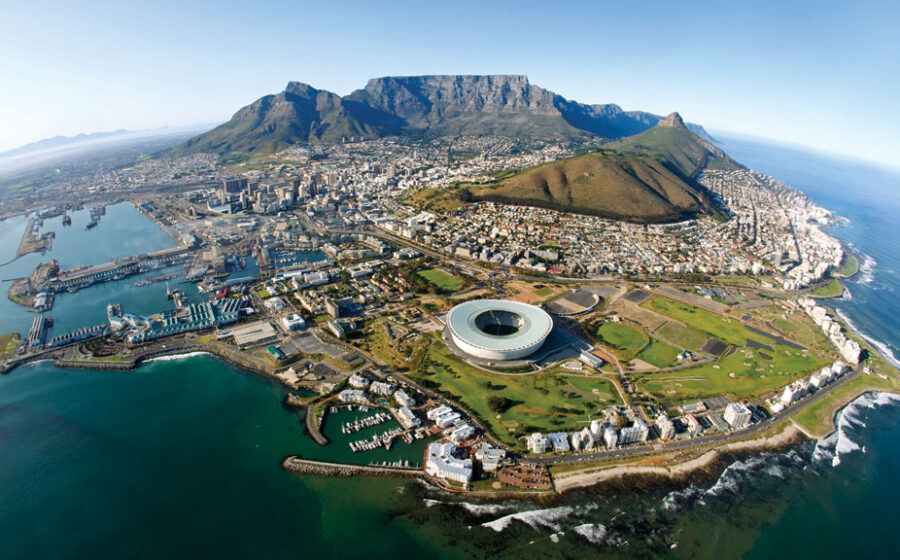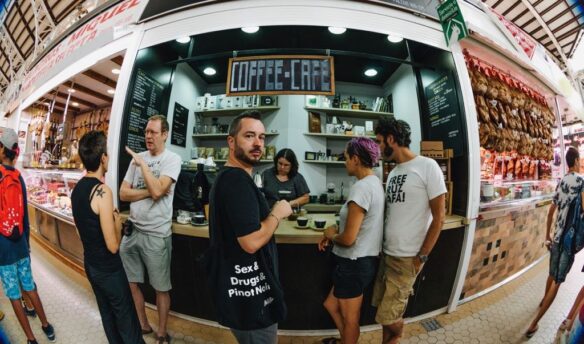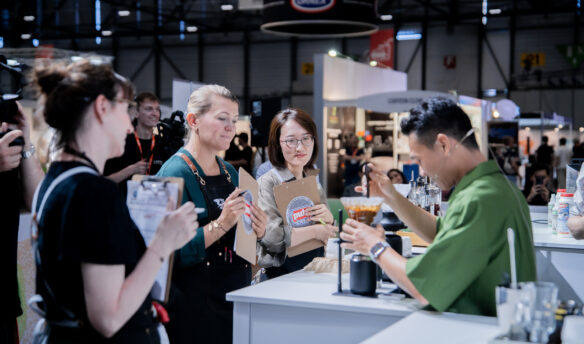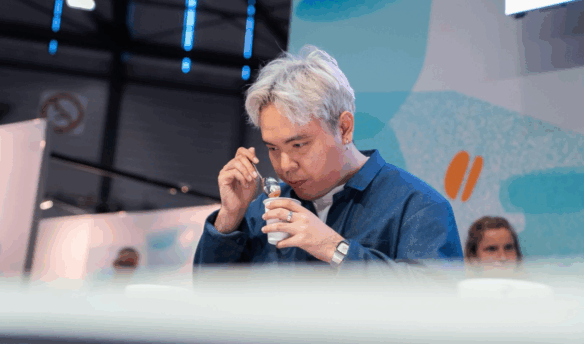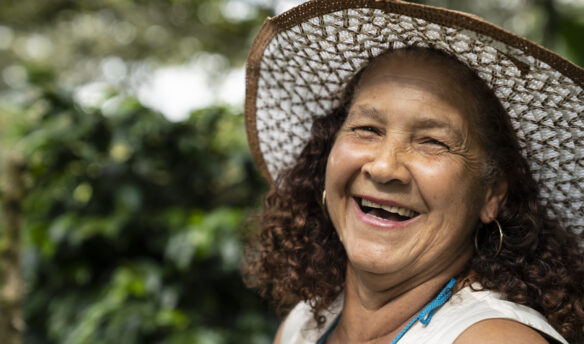[C]ape Town has it all. Watched over by the iconic Table Mountain, it has more beaches, hiking trails, surf breaks, and fishing spots than any of its four million residents could possibly need—all within city limits. It’s a thriving urban environment which boasts South Africa’s best restaurants, bars, and clothing boutiques. With around fifty roasteries in the city itself, it’s also the epicenter of a nascent coffee revolution.
IN THE BEGINNING
Before 2006, “there was no decent coffee in Cape Town. Everyone believed that something good had to come from somewhere else. Posh people were proudly drinking brand name coffee that had spent months getting out here on a ship,” Joel Singer, cofounder of Origin Coffee Roasting says, reminiscing with a laugh.
Singer grew up in Canada, but didn’t develop an appreciation for artisanal food and beverage until college, during a year abroad in France. He fell in love with the country’s commitment to quality food and drink. “The French would get excited about this one plum that only grows in one little town and is only ripe for one week every year,” he says.
Singer eventually found himself in Cape Town with a young family and no fixed agenda. He teamed up with David Donde to launch Origin Coffee Roasting. When they met, Donde was operating a hotel, where he prepared Singer an espresso—what Singer calls the first decent espresso he’d had in South Africa. As their friendship developed over their shared love of coffee, food, and wine, plans for the roasting company began to coalesce.
“I was passionate about roasting the best coffee in the world,” Singer says, “and David wanted to serve the best coffee in the world.”
Singer and Donde launched Origin knowing very little about coffee, and even less about how to roast it. Donde attributes his barista skills to “brute force methods”—and lots of milk sacrificed in the name of latte art practice. They began to experiment on a five-kilogram roaster, testing roast profiles and various origins to find what worked. But even as the coffee started tasting good, getting wholesale customers on board presented a new wave of challenges.
“We had to convince everyone—consumers, restaurants, hotels—that they didn’t have a clue” Singer says.

Recognizing the need for education led Singer and Donde to start big—with a roastery, a barista academy, and a café. Customers would pass by the roaster as they walked in the door, exposing them to more of the process than the Cape Town community was accustomed to. “I was the first person you’d speak to when you came in,” Singer says. At the time, their approach was groundbreaking and helped the brand gain traction and a loyal customer base.
Now, eleven years later, Origin is still at the cutting edge of everything coffee in Cape Town. They roast about fifty different coffees every year and on any given day, patrons can drink twelve of them at their alternative brewing methods bar. They have locations in both Cape Town and Johannesburg and their coffee is served at many independent outlets nationwide. Origin also helped set up the Specialty Coffee Association of South Africa, and has had four national barista champions over the years. Many of the big players in the South African coffee scene have a stint at Origin on their résumés—at last count, they had trained 2,500 baristas.
KIWI DELUXE
One of these Origin alumni is Judd Francis, the burly, bearded Kiwi who co-owns Deluxe Coffeeworks. He grew up in Wellington, the coffee center of New Zealand, and began working in cafés at age sixteen. “After school I got a job in a roastery and then, like all Kiwis, I went traveling. And everywhere I went, I ended up behind the coffee machine,” Francis says.
When Francis washed up in Cape Town he could see there was a huge gap in the market. “Here was a gorgeous city with amazing restaurants and incredible weather that was practically screaming for good coffee.” Francis worked briefly with Singer at Origin, but he was up front about his intentions to start his own thing. “In 2009-ish I met Carl Wessel, over a few beers. Carl was keen to get out of the film industry and I was looking for something to do with the rest of my life. The business was founded on a handshake.”
They started roasting in Wessel’s backyard, and within months they’d opened their first shop, a tiny spot in the center of town. “After about two years it got pretty intense,” Francis says. “We were doing two tons a month on a five-kilogram roaster, all in a 190-square-foot space that also served coffee.” At that point they moved to their roasting operation to its current location and bought a fifteen-kilogram Giesen.
Deluxe’s core business has always been wholesaling coffee but they’ve opened a surprising number of cafés along the way. “We just keep getting offered these amazing spaces,” Francis explains. “It seems stupid to say no.” That said, they keep their retail outlets surprisingly simple: no food, no Wi-Fi—just coffee.
And lots of it. In addition to servicing around 200 wholesale customers, Deluxe has a thriving online store, six coffee shops in Cape Town and the surrounding areas, and a recently opened satellite roastery and café in neighboring Namibia. They’ve also helped a luxury hotel group based in Mauritius set up its own roastery, a project which they’ve been heavily involved in for the last four years. “We flew up to Jo’burg to pitch the idea to all these suits sitting around a boardroom table. We had a PowerPoint presentation and everything,” Francis says, “but we’d also rented a GS3 for the day. After a few slides we just thought ‘stuff it,’ let’s make them some coffee. They lapped it up.”
This cheeky attitude, coupled with a serious taste for hard work, has allowed Deluxe to thrive in a very competitive market. “Look at us: we’re all covered in tattoos, ride motorbikes, and play in bands,” Francis says. “We drink good coffee by day and too much beer at night. Coffee doesn’t have to be served on a doily, you know.”
NEW KID ON THE BLOCK
With ten branches in the city and counting, it’s hard to believe Bootlegger Coffee Company opened its first outlet less than four years ago. Even more amazing is the fact CEO Pieter Bloem hasn’t had to lean on any external investment to achieve this meteoric rise. Bloem first got into the service industry when he bought and ran a very popular pizza franchise. At about the same time, his wife opened a small coffee shop, but soon she had two, then three shops.
“I was sick of working for someone else and I saw an opportunity. Coffee was my wife’s main commodity, so it made financial sense to roast it ourselves,” he says. “And it helped that I’ve always been a coffee addict.” Bloem and his partners started small, roasting their coffee at a small bakery they owned several hours from Cape Town.
But one day, on his morning bicycle ride, Bloem spotted an empty retail space just around the corner from his house in the beachside suburb of Sea Point. “After all those years in the restaurant business, I wanted to leave food behind,” remembers Bloem, “But the place was far too big for just a coffee roaster, so we were kind of forced into making it a restaurant as well.”
These days, Bootlegger stores are open from 6 a.m. to midnight every day, and they serve up innovative pastries, breakfasts, lunches, and dinners—including the Ice-ssant, a croissant filled with soft-serve ice cream, and the recently featured Scram-bowl, egg scramble bowls filled with sausage, cheese, and onion. Bootlegger also boasts a full wine list and bar to accompany their signature coffees.
Bootlegger’s café and roastery are run as separate businesses: half of the roasted coffee is sold to Bootlegger cafés at market-related prices and the other half to external clients. He puts it simply: “The roastery needs to wash its face and the cafés have to be profitable.”

Bootlegger will have four more Cape Town stores by the end of the year as well as one in London, England. They are looking at expanding their footprint to Johannesburg and Durban, South Africa, and plan to franchise the brand into other African markets. “Whatever happens, we’ll always maintain 100 percent control of the Cape Town stores,” Bloem says.
THE PERFECTIONISTS
The husband-and-wife team behind Espresso Lab Microroasters, Renato Correia and Helene Vaerlien, focus on quality in smaller quantities. “It’s not that we don’t want to grow, but quality has always been our main focus, and this is easier to achieve in small quantities,” Vaerlien explains.
Vaerlien’s roots are in Sweden, and Espresso Lab is undeniably inspired by Nordic coffee culture, among other influences. Correia worked at an Italian-owned café in Johannesburg in the eighties, and both he and Vaerlien spent years traveling the world, experiencing different coffee cultures.
“At first we wanted to open a café,” says Renato, “But then we realized that to have full control, we had to roast our own.” From day one, they have been both a café and a roastery and they have never served any food. “We’d rather up-sell coffee, the one thing we’re passionate about,” Correia explains.
All milk-based drinks served in the café are made using a blend of three single-estate coffees, while anyone who orders a black drink is in for a single-origin treat. Staff are all dedicated black-coffee drinkers: no milk, no sugar. “We brew coffee together every morning and then we talk about it. It’s important to have a shared vocabulary that we use when talking to customers.”
“When we opened, light roasts were not the norm in Cape Town,” remembers Correia, who still roasts every single batch of coffee that comes out of the shop. “Customers had to get used to the upfront fruity flavors. And to paying higher prices.”
But Vaerlien and Correia had chosen their location carefully: being next-door to Cape Town’s busiest outdoor market meant that they could pay the rent based on Saturday trade alone. This allowed them to forego spending money on marketing, affording them more funds to buy top-quality coffee and equipment.

Espresso Lab has a very loyal midweek customer base as well as busy weekends, and their coffee is served in seven cafés around the western Cape, as well as at the head office of one of South Africa’s leading investment funds. “We could supply loads more places,” says Vaerlien, “But we have certain standards when it comes to equipment and training that put a lot of people off.”
Vaerlien says quality equipment allows them to share their techniques and brewing protocols and enables them to serve customers a better, more interesting product. Espresso drinks are made using La Marzocco GB5s and Mazzer Robur grinders, while filter coffees are made using a Marco SP9 hot water tower and a Mahlkönig EK 43. “Most of the baristas on our staff already have basic barista skills when they start here, such as basic espresso extraction and milk aeration technique, so our ongoing training is more about refining their sensory skills, learning about the coffees we serve, and customer service,” Vaerlien says.

Espresso Lab’s customer-oriented service style means providing education to some guests, but allowing others to enjoy their coffee without any additional information. “We don’t force information onto our customers,” Vaerlien says. “However, when someone is interested, we share our knowledge. The more the customer knows about the coffee, the more they can enjoy it and take something home from the experience.”
THE WAY FORWARD
Cape Town’s coffee scene has come a long way in the last ten years. As for the future? The current business leaders are convinced the scene will continue to grow as consumers become increasingly focused on quality. Says Origin’s Singer, “The first ten years were about getting people to figure out the difference between good coffee and bad coffee. Right now, anyone who turns green coffee into brown is considered an artisan roaster, but that’s going to change.”
As consumers demand better quality coffee, restaurateurs and café owners will have to step up their game. Focus on provenance is likely to increase, inspiring new levels of quality and diversity in the café experience. Espresso Lab’s Correia says there still aren’t many cafés specializing in serving great coffee. “People here think that to have good coffee you have to roast your own. There aren’t many cafés around that buy top product and serve it really well.”
But the market has taken flight and shows no signs of slowing down. “One thing’s for sure,” says Bloem of Bootlegger, “People love coffee. And that will never change.”
—Nick Dall is a world-traveling journalist and copywriter who is rediscovering his hometown of Cape Town.



